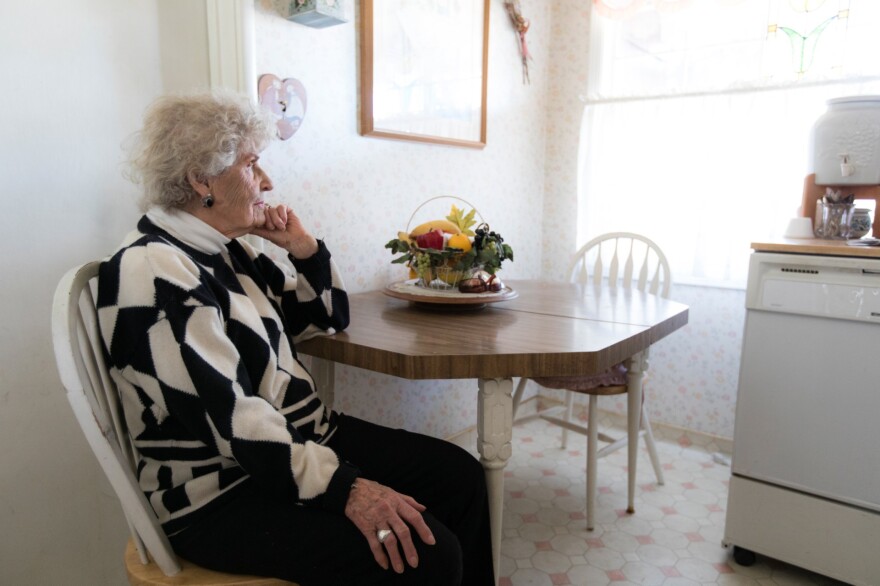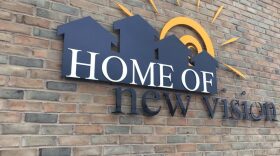RESOURCES:
Ypsilanti Meals on Wheels (YMOW)
TRANSCRIPTION:
David Fair: This is 89.1 WEMU, and I'm David Fair. It has been said that you can tell a lot about a nation or a community in the way it cares for its children and its elderly. Those are two segments of the American population facing increasing uncertainty when it comes to housing and food security. Federal budget cuts are already impacting government and nonprofit organizations' ability to support food for our senior citizens. And it may get worse before it gets better. For an insider's look as to what is happening here in Washtenaw County, we're checking in today with Barbara Niess-May. Barbara is executive director of Ypsilanti Meals on Wheels. And thank you so much for carving out time today! I'm grateful!
Barbara Niess-May: Always happy to talk about Ypsilanti Meals on Wheels! Thank you, David!

David Fair: Now you took this job a little over a year ago. A lot has changed. Is this what you imagined?
Barbara Niess-May: Well, I've been in nonprofit work long enough to know that anything can change, and you can set a plan, which I think is important to do visioning and planning but also be ready for the pivot. I did not expect this, but I can say the great news is that I didn't expect to feel this work so deeply and to consider it so sacred.
David Fair: So, what have been the impacts of federal policy and budget changes on Ypsilanti Meals on Wheels to this point?
Barbara Niess-May: Well, they're numerous. I'm going to kind of start with the primary and then secondary and tertiary. So, primary, of course, is funding coming in for our food. We received $250,000 through the administration and community living. And that comes through the state, through ageways, and then through Office of Community and Economic Development. And what has happened in the last several weeks is that as HHS has been reorganized, the administration of community living has also been dismantled. So, we haven't heard if the funding has been cut. However, there is nobody there to work on its distribution. And also, there is no plan in place for it to continue.
David Fair: How do you plan when there's no plan?
Barbara Niess-May: Well, yeah, that is the question. The board has discussed, and I've discussed with leadership and community members, about a contingency plan back in February when things started to bubble up with things changing. And as a result, we do have a contingency plan where we're wanting to get the word out to the community, not in an alarmist way, but just to let people know there are some very real impacts that are coming for Ypsilanti Meals on Wheels. And then, this is where I'd like to talk about the secondary, and then I'll continue a little bit about the contingency plan. The secondary impacts are things like Medicaid, Medicare, Social Security, and other benefits and support, like food banks, like Food Gathererers, and how they support the older neighbors, though they're adult neighbors, that we serve. If they have any losses in those areas, it further destabilizes them. Some people don't realize that approximately 85% of our clients live at or below the poverty level. So, it's already a tenuous situation, and it's going to be made worse by loss of federal support for these programs. And local philanthropy can't replace this kind of money. So, there's that reality. And then, from a tertiary perspective, is that the loved ones who care for older adult neighbors or older adult family members often are impacted by these sorts of cuts as well, whether it's SNAP benefits or they might be working two and three jobs just to keep things together. So, it's almost like this collapse of a system that is supporting people who are over 60 and medically homebound. So, flipping back to our contingency plan, we want people to understand and we look forward to our community understanding that these different things are happening, and that it's not just $250,000 for food, which is half of our food budget for those we serve. There's so much more going on to those that need our assistance. We may not be able to provide it. Right now, we're feeling like we need to use what we have in reserves to support our older adult neighbors until we get a clearer picture. However, that can't go on forever, and we need figure out how we're going to address this as a community.

David Fair: This is 89.1 WEMU. We're talking about uncertainty when it comes to food security for our older adults with Barbara Niess-May. She is executive director of Ypsilanti Meals on Wheels. Back in November of last year, Washtenaw County voters approved an older person services millage. Proposal three passed with 57% voter approval. And, Barbara, the County Board of Commissioners has been exploring how best to dedicate the money generated through the half-mill tax levied each year. What conversations have you had with commissioners about the uncertainty regarding access to food for seniors and how this money may be used?
Barbara Niess-May: Of course, I've been talking about food insecurity. That probably wouldn't be any surprise that also to figure out. One thing that I have tried to give voice to, or I hope I've given voice to, is equity and distribution of the funding, as well as paying attention to the areas of the county where there may be less opportunity. For example, another thing that is notable about the area that we serve in our routes, we have seven main routes and about nine mini-routes, and there's one grocery store on one of those 16 routes. So, I mean, that speaks to not only is there food insecurity, there a food desert. So, that, for me, says food is just not readily available or healthy nutritious food is just not readily available and that we need to be paying attention to that. I've also been talking to the commissioners about how what we do in terms of the provision of food in a wellness check and other services that we provide is actually helping people who love the older adults in their lives, whether they're neighbors or family. And then, they are able to better take care of their own business or work or take care of children and things like that. So, we're a very strong and important part of an ecosystem for older adults.
David Fair: I want to talk more about that ecosystem. There are a wide range of nonprofit organizations in the county that work together to try and ensure the well-being of seniors and provide an enhanced quality of life. What are you hearing from some of your partners about the current state of affairs and their ability to supplement services that you all collectively do?
Barbara Niess-May: I think it's a mixed bag. I mean, I think there are days where we can all say, "We're stronger than this!" And I think there are day of "How are we going to get through this?" And then, both can come up in one day. There are already organizations that are part of this ecosystem that have experienced incredible losses of funding, or they know that it's coming to pass. But one message I think we all want to make clear is that we will get through this. We don't know what it looks like. And thank goodness the county voters did put in place the senior millage, so that there is a resource to turn to when we're serving our older adult neighbors.
David Fair: Once again, we're talking with Barbara Niess-May from Ypsilanti Meals on Wheels on 89.1 WEMU. Let's look more to the positive, at least immediately. For the time being, your clientele can depend on stability of service. Correct?
Barbara Niess-May: Yes! Absolutely!
David Fair: And what else should we be looking at optimistically about Ypsilanti Meals on Wheels' role in serving our community?
Barbara Niess-May: Well, again, the good news is that because of the hard work of people currently working here and on the board and volunteering and the past, I mean, we've been in the community for 50 years, there is an incredible amount of goodwill in this community to say we must continue this work. And I think we will find new ways to partner with each other and find opportunities to meet the needs while other situations are happening. I'm not saying it's going to be perfect or it's going to be easy. However, this is when we can all come together and say, "What is it all that we can agree on?" and "What is that that we try and move the needle on and make an impact for?" I don't know how long we might be facing some of these issues. And I just can't believe it's going to be forever. So then, when the tide turns and we're able to have more resources from the federal government, we may have found new ways of doing things that will be exponential in supporting others. I also need to be pragmatic. I try to have a healthy dose of optimism. Like, we're stronger than this. We'll get through this. We'll work it together. I also can't minimize that we're in a very unique point in time in our history of how these sorts of issues are being treated. And people ask me every day, "What do you think will happen?" And I said, "I couldn't have even predicted this a year ago." So, I'm not sure. I'm the best crystal ball reader. But I do know that this community cares. We are going to be working together to make sure that no older adult neighbor goes hungry.

David Fair: And we will have these conversations as we move through the uncertainty. Thank you so much for the conversation and insights, Barbara!
Barbara Niess-May: Thank you for your time!
David Fair: That is Barbara Niess-May, Executive Director of Ypsilanti Meals on Wheels. For more information, check out our website at wemu.org. I'm David Fair, and this is your community NPR station, 89.1 WEMU-FM Ypsilanti. Celebrating 60 years of broadcasting from the campus of Eastern Michigan University!
Non-commercial, fact based reporting is made possible by your financial support. Make your donation to WEMU today to keep your community NPR station thriving.
Like 89.1 WEMU on Facebook and follow us on X (Twitter)
Contact WEMU News at 734.487.3363 or email us at studio@wemu.org






